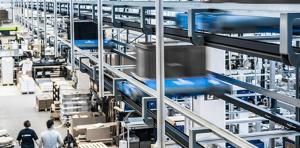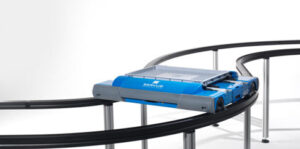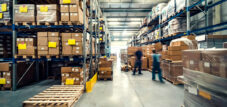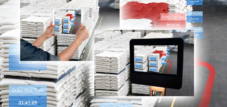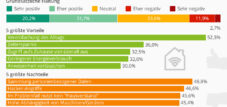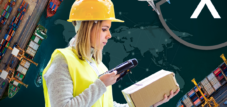Industry 4.0 – Transport logistics is changing
Language selection 📢
Published on: December 31, 2014 / Update from: September 28, 2021 - Author: Konrad Wolfenstein
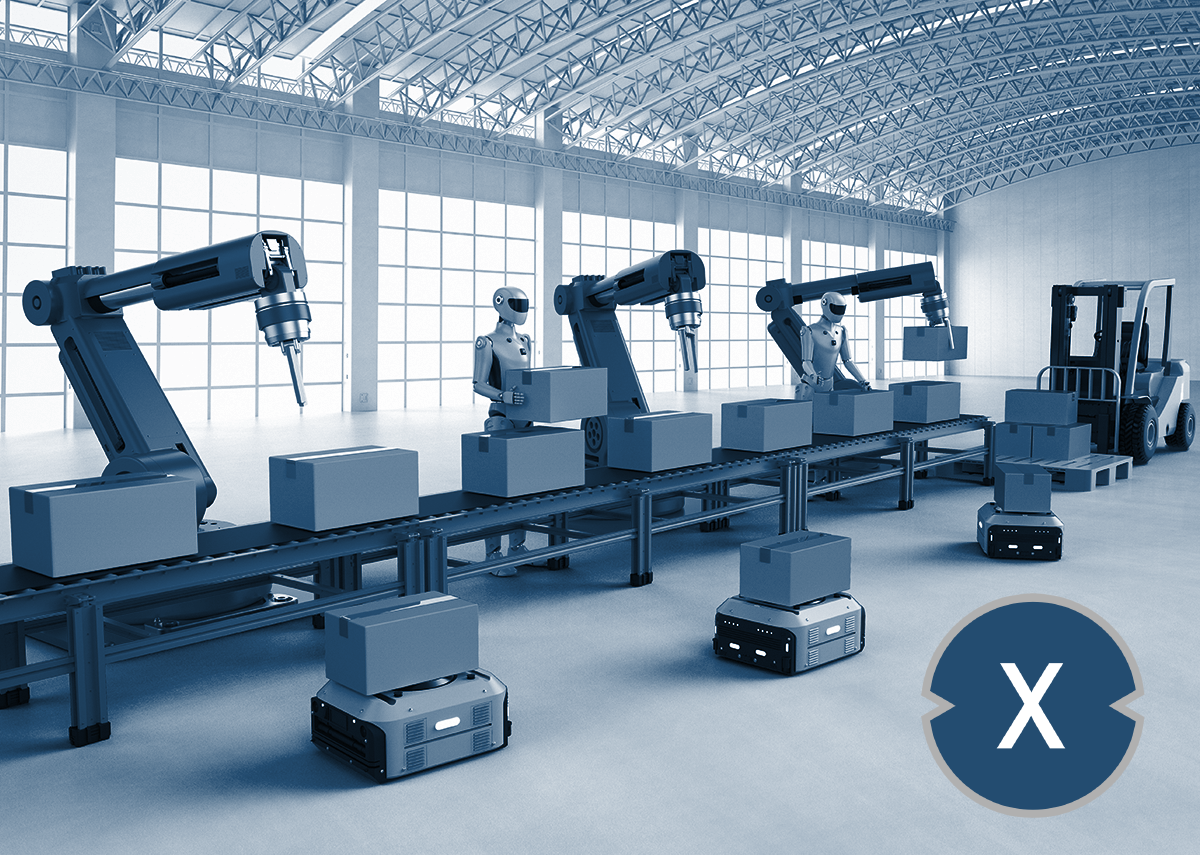
Industry 4.0: Smart Factory – Smart Logistics – Image: Xpert.Digital / Phonlamai Photo|Shutterstock.com
Industry 4.0 – a term that has been a buzzword for some time and has been the subject of much discussion in industry and politics. In the actual sense, Industry 4.0 refers to a future project of the federal government, which envisages the close integration of IT and manufacturing technology in order to make the local industry fit for future challenges.
Accordingly, the fourth industrial revolution proclaimed in the strategy paper, driven by the extremely rapid development of the Internet, will lead to the merging of the real and virtual worlds, which will ultimately lead to an Internet of Things (IoT). Here it is the products or components themselves that network and communicate with other items, users or means of transport in order to generate trouble-free and even more efficient processes.
A sign of the change towards Industry 4.0 is the increasing importance of networking IT systems embedded in production and logistics processes, both with each other and with the Internet in general (so-called cyber-physical systems, CPS). The ever greater and faster development of automation and interconnection in industry is accompanied by the creation of ever more intelligent monitoring and control technologies with which companies can control and optimize the entire value creation network in almost real time. A development that will initially result in the implementation of completely autonomous decision-making processes in production and transport.
One step towards this is the self-learning, intelligent factory ( Smart Factory ). The focus there is on the development of intelligent, self-regulating production systems and processes as well as on the implementation of networked, independently communicating production facilities.
Smart Logistics: Logistics of the future
smart technologies are also increasingly finding their way into transport logistics
But what are smart technologies anyway?
These are computer-aided systems that fully automatically control entire work processes and are able to act autonomously and thus control an entire process independently.
Today's logistics have little in common with the relatively one-dimensional storage and shipping of goods from a few years ago. The reason is precisely the new web technologies, which allow a whole new level of interactivity between participants. And development continues at a rapid pace. Partially or even fully automated transport systems are already being tested in various ways.
Smart Factory – the intelligent factory of the future
The German Research Center for Artificial Intelligence (DFKI), in collaboration with various manufacturers, has developed a first prototype of an intelligent factory of the future - the so-called Smart Factory . The main feature is their composition of independent production modules that independently communicate with each other using a variety of information systems. Human labor only has an assisting role in the production process.
Three central building blocks form the basis of the development:
- the intelligent, communicating product
- the networked system
- the assistant operator of the system
With the help of integrated sensors (e.g. RFID or Bluetooth), the intelligent product is permanently informed about its current order, material and production data and thus influences its own production. The networked system communicates in parallel with the individual intelligent products via CPS components and monitors the individual work steps. In this system, the human, assistant operator is directly informed by the product about the details of the assembly, including the necessary work steps.
Smart factory and data logistics
In the Smart Factory, the usual separation of production planning and production control no longer applies. Instead, an integrated approach takes place in which the machines exchange information and forecasts about the production process with each other and coordinate the further work steps. Data on material flow, utilization of machines and storage systems, and resource consumption are also incorporated into the process and taken into account when planning measures. In order for the flow of information to have a permanent impact on ongoing production, it must take place between the devices in real time.
This is the point at which data logistics plays a particularly important role, as it must ensure that all data, current and forecast, is available quickly and comprehensively and is forwarded without any loss of time.
This modern type of production does not end at the Smart Factory company gate. The integrated, order-oriented approach to manufacturing, which covers the entire value chain from raw materials to the finished industrial product, requires cross-company thinking and data logistics to ensure a smooth exchange of information.
The challenges associated with this are enormous. On the one hand, a huge stream of data is to be expected, which will require a comprehensive reorganization of the IT infrastructure. A rapid expansion of the pipeline network is therefore essential for the success of the project.
In addition to the qualitative and quantitative expansion of data lines, data logistics faces another highly complex and currently much-discussed task: ensuring comprehensive data security. In addition to ensuring the availability of data for authorized persons, maintaining their confidentiality plays a central role. It is important to avoid the intrusion of unauthorized persons as well as the loss or unauthorized disclosure of confidential data. Data logistics specialists are therefore faced with the task of advancing the development and operation of comprehensive security concepts and standards.
The connection between data and transport logistics
In addition to data logistics, transport logistics will also play an even more important role in the wake of Industry 4.0. This is specifically about the complete networking of all objects involved in the transport chain. This has already been implemented in large areas and in daily use in a variety of applications: flexible route planning based on forecast traffic conditions or weather and software-supported control of traffic flows are just two examples. But technical development does not stop at this point. The introduction of intelligent, self-driving vehicles in a transport infrastructure based on the Internet of Things will open the door to completely different dimensions of automated and flexible logistics solutions.
In this area, data and transport logistics go hand in hand, as the former provides the information that can be used to optimize transport logistics. The more comprehensive the exchange of current capacity, weather, traffic and vehicle information, the more efficiently the increasing logistics flows can be controlled. In times of growing production and the transport of ever smaller batch sizes (keyword e-commerce), the production and sales sides are virtually dependent on the performance and flexibility of transport logistics. The vision of a fourth industrial revolution in general and the concept of the smart factory in particular can only be realized if this can guarantee that raw materials, preliminary products or items that can be shipped are on site in a timely manner.
It is to be expected that smart technologies will become established in production sooner or later. But how does this affect warehouse logistics? Will development there take place in the same or similar form?
There are enough signs of this.
Smart transport systems in the warehouse
Without central control, these devices negotiate incoming transport orders with each other, set right-of-way rules and exchange data about their respective positions in the warehouse. Since each shuttle processes its information decentrally, the entire control system is distributed across many virtual shoulders. If malfunctions occur, the swarm of vehicles reacts itself and corrects the problem.
Self-sufficient transport robots
This is where the two companies Kardex Remstar and Servus Intralogistics come in. Under the keyword Smart Factory they have developed a new solution to optimize their customers' internal production logistics.
The basic building blocks of the solution are dynamic provision solutions from Kardex Remstar and a special transport system from Servus Intralogistics, which consists of autonomous transport robots that travel on rails. The products from both companies have been available separately for a long time. What is new is that the components are combined into an efficient overall solution using newly developed software. The parts required for assembly are stored in a space-saving manner in the vertical storage lifts, circulation racks or container storage systems from Kardex Remstar. At the time of provision, the Servus transport system automatically takes the parts from the warehouse and transports them to the assembly workstations with the help of autonomous transport robots. The devices automatically receive information about the required work steps and carry out all further steps independently. The Servus system therefore does not require a central control, as the transport robots communicate directly with the other transport robots and work stations using infrared and thus react to their immediate environment. The Servus transport system proves to be particularly flexible as it allows free routing in the factory hall and adapts optimally to existing building structures. This means that the route can be installed at any point - from floor to ceiling - in the warehouse and production halls.
Swarm intelligence from the Fraunhofer Institute
container storage and transport system called Multishuttle Fraunhofer Institute for Material Flow and Logistics shows a fundamentally comparable approach, but in its current form goes further .
The basic idea is that the significant benefit of a storage system is not only measured by the pure storage and retrieval performance, but also the speed at which the storage containers reach their destination. As a premise, the specialists at Fraunhofer IML assume that in warehouse logistics the proportion of conveyor and storage systems for small load carriers will continue to increase compared to pallet conveyor and storage systems. The reason for this is the constant reduction in shipment sizes and the resulting inventory reduction measures in industry and trade.
The original idea involved the development of a transportation system using low-cost, rail-guided vehicles. They should also be able to carry out storage and retrieval processes in the warehouse independently in order to be able to handle the entire transport from the warehouse to the work station without any further handling operations. This idea gave rise to the so-called Multishuttle , which operates similarly to the Servus transport trolley.
However, the engineers quickly recognized the limitations of this solution: the inflexible rail system. They then set about further developing the multi-shuttle, which would navigate the warehouse without rails. In collaboration with the company Dematic, the institute developed the MultiShuttle Move , which is compatible with the conventional rail system, but is also equipped with a floor chassis and an intelligent navigation system. The vehicle is equipped with laser scanners on the front and back, which serve both for route finding and as a security function in corridor operations. With the help of the integrated positioning technology, it can move completely freely in space and react dynamically to changes without any guidelines or other fixed markings. The permanently installed conveyor technology is thus reduced to a minimum and at the same time maximum flexibility is achieved.
With the new system, the intelligent and interconnected transport vehicles carry out all transports, for example from a high-bay warehouse to the work stations where they are further processed or picked. However, the agile helpers are not guided by warehouse management software on their journey, but coordinate independently with each other without any central control. Since this type of warehouse logistics requires a large number of little helpers, software would be overwhelmed by the complexity of the control tasks for this swarm of robots. As it is, they are able to move completely freely in the high-bay warehouse on rails and on the ground.
The devices communicate and control each other according to the principle of swarm intelligence. This is achieved through the use of newly developed sensor technology, which is equipped with functionalities such as radio location, distance and navigation instruments. This means that the individual shuttles always look for the direct and shortest route to their destination, coordinate with each other about taking on orders and finding the optimal route, thus ensuring maximum throughput in the warehouse and thus efficiency.
Collisions are also avoided thanks to the integrated sensor concept, which automatically stops the vehicles in the event of an impending collision with another device or a person. Otherwise, fixed right-of-way rules apply in the warehouse, similar to road traffic.
If there is a need for additional resources, the system's transport performance can be flexibly adjusted by increasing the number of vehicles. Investments in fixed systems are not necessary.



